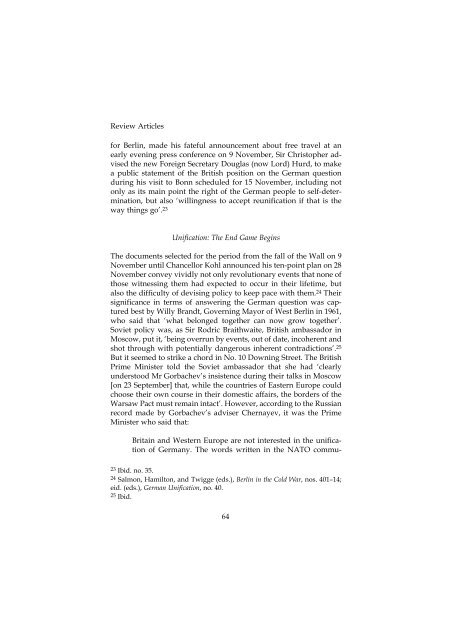Download - German Historical Institute London
Download - German Historical Institute London
Download - German Historical Institute London
Create successful ePaper yourself
Turn your PDF publications into a flip-book with our unique Google optimized e-Paper software.
Review Articles<br />
for Berlin, made his fateful announcement about free travel at an<br />
early evening press conference on 9 November, Sir Christopher ad -<br />
vis ed the new Foreign Secretary Douglas (now Lord) Hurd, to make<br />
a public statement of the British position on the <strong>German</strong> question<br />
during his visit to Bonn scheduled for 15 November, including not<br />
only as its main point the right of the <strong>German</strong> people to self-determination,<br />
but also ‘willingness to accept reunification if that is the<br />
way things go’. 23<br />
Unification: The End Game Begins<br />
The documents selected for the period from the fall of the Wall on 9<br />
November until Chancellor Kohl announced his ten-point plan on 28<br />
November convey vividly not only revolutionary events that none of<br />
those witnessing them had expected to occur in their lifetime, but<br />
also the difficulty of devising policy to keep pace with them. 24 Their<br />
significance in terms of answering the <strong>German</strong> question was captured<br />
best by Willy Brandt, Governing Mayor of West Berlin in 1961,<br />
who said that ‘what belonged together can now grow together’.<br />
Soviet policy was, as Sir Rodric Braithwaite, British ambassador in<br />
Moscow, put it, ‘being overrun by events, out of date, incoherent and<br />
shot through with potentially dangerous inherent contradictions’. 25<br />
But it seemed to strike a chord in No. 10 Downing Street. The British<br />
Prime Minister told the Soviet ambassador that she had ‘clearly<br />
understood Mr Gorbachev’s insistence during their talks in Moscow<br />
[on 23 September] that, while the countries of Eastern Europe could<br />
choose their own course in their domestic affairs, the borders of the<br />
Warsaw Pact must remain intact’. However, according to the Russian<br />
record made by Gorbachev’s adviser Chernayev, it was the Prime<br />
Minister who said that:<br />
Britain and Western Europe are not interested in the unification<br />
of <strong>German</strong>y. The words written in the NATO commu-<br />
23 Ibid. no. 35.<br />
24 Salmon, Hamilton, and Twigge (eds.), Berlin in the Cold War, nos. 401–14;<br />
eid. (eds.), <strong>German</strong> Unification, no. 40.<br />
25 Ibid.<br />
64













